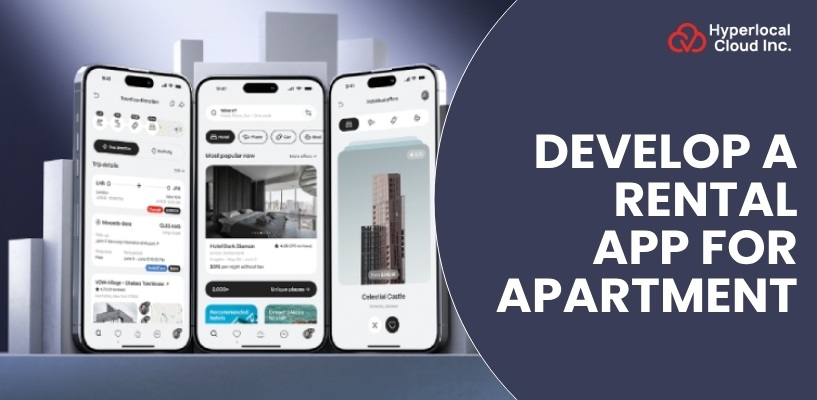Develop A Rental App For Apartment

Rapid digitization has transformed every sector, including real estate. This has resulted in proper property management, easing the operations for landlords and tenants. One popular platform that has grabbed the eyeballs is online apartment rental apps, which make the searching process quick and easy.
Want to invest in the best apartment rental apps? Look no further; this blog will take you through every step of developing a rental app to help you gain a competitive edge in the market.
Why Are Apartments Rental Apps Popular?
As technology on mobile phone devices flourishes, more applications find their way to daily needs-including ordering a meal to calling a taxi-and now, finding one’s rented apartment is on the same list. The popularity is due to how making something that was earlier grueling was very smooth. Renters don’t have to go through hundreds of listings on various websites or visit different properties on different dates. Apps allow renters to view options, apply filters according to their choice, and even submit rental applications directly from their cell phones.
Convenience: Allows a person to search for a property at any time, from anywhere
Efficiency: Multiple listings and applications can be handled at one time for landlords and property managers
Transparency: Reviews, ratings, and detailed listings make decision-making easy for users.
Payment Processing: Tenants can safely pay rent and deposits through the apartment rental app.
The above advantages prove that these platforms are favorites among users, making it vital for businesses to invest in them. If you want to be in the race of successful entrepreneurs, now is the time to venture into this lucrative industry and skyrocket your sales.
Best Apartment Rental Apps Available
Zumper app
Build an app like Zumper that will streamline every rental operation with a user-friendly interface, making property searches, listing management, and payment transactions seamless.
Airbnb app
Helps with a feature-rich Airbnb clone app; the workflow is synchronized, and reviews, listings, currency, and payments are managed perfectly.
Zillow app
Build a user-friendly Zillow clone with advanced communication tools, analytics and reporting, and property listing management to ease the search, listing, buying, selling, and renting of properties.
Get Your Personalized Apartment Rental Apps In Just A Single Tap!
Spectacular Features Associated With Apartment Rental Apps
For Tenants
Easy Search Filters: Helps users search by location, rent range, and availability of features such as parking, pet-friendliness, laundry facilities, and property type.
Interactive Map View: Performs searches based on locations using an interactive map that shows schools, parks, public transportation, grocery stores, etc.
Booking Availability: Provides real-time updates about when the space will be ready for viewing and offers tours or viewing appointments that can be booked directly through the app.
Payment Option: Enables users to securely pay rent through various modes, such as credit/debit cards, bank transfers, or other payment options like PayPal.
Lease Signing: Allows the tenants to digitally sign lease agreements through their application and view lease documents and addendums.
Reviews & Ratings: Allows tenants to leave feedback regarding rental experiences and view the reviews given by the previous tenants.
Real-time communication: Helps the tenants chat with the property owners or landlords and ask questions related to maintenance and resolving issues.
Push Notifications: Provides instant alerts about lease renewal reminders, due dates, maintenance updates, insurance recommendations, etc.
For Admin
Dashboard Overview: Helps track daily, weekly, or monthly snapshot summaries of app activities so you can easily evaluate its progress. It also provides a real-time overview of what the users have been doing, including the count of rentals, percentage occupancy, revenue, and more.
Booking Management: Allows the admin to have all the information on bookings, such as the status—pending, confirmed, canceled, and users. They can even cancel or change the dates for any special event, like reservations.
Financial Management: It helps view and handle all the transactions that took place, such as rental payments, refunds, cancellations, revenue tracking, commissions, etc.
Review Management: Manage user feedback: View, approve, and respond to reviews, ensuring a fair and positive feedback environment.
Promotion Management: Enables admin to design and run promo codes, seasonal discounts, or other special offers for users to gain customer loyalty.
Reports and Analytics: Track user engagement, bounce rates, and session time and use advanced reporting tools to generate performance reports to gauge success.
Content Management System: Manage articles, news, updates, and FAQs so users can interact with the site and keep up with related information.
Security Management: Manage user data and ensure compliance with data privacy laws, such as GDPR, through data encryption protocols and two-factor authentication.
Activity Tracking: Helps the admin identify user action patterns to gain insights into typical behaviors and preferences to fetch customer attention.
For Renters
Property Listing Management: Enables renters to list their apartments on the app by uploading photos and videos and listing them at updated prices.
Application Management: With this feature, landlords can filter applications and accept, reject, or automatically execute background and credit checks via third-party integration services.
Payment Management: Helps the renters handle payments, send automated rent reminders to tenants, and generate auto invoicing.
Service Requests: Allows tenants to send, manage, and track maintenance requests for quick resolution.
Property Performance Insights: An intuitive dashboard provides a precise performance analysis of the given property regarding collected rents, vacancies, and application status.
Tenant Screening: With this feature, renters can screen for credit, rental history, criminal background checks on tenants, and pre-screening questions on the app.
Automated Renewal Reminders: Provides prompt notices to renters/landlords regarding lease expiration and renewal opportunities well in advance.
Property Marketing: Helps renters to post listings on multiple sites for broader reach and use social media integration to make it easier to share and promote
Document Management: Helps in the centralized storage and management of all rental documents, such as lease agreements, payment records, and maintenance logs.
Ready To Get Started With Apartment Rental Apps?
Step-By-Step Process To Develop Apartment Rental Apps
Conduct Market Research
The first step is to understand the target audience and the competitors. This will help identify the strengths and gaps in popular rental sites. After that, establish a unique value proposition that distinguishes your app from the rest.
Defining Key Features
Depending upon the intense research, the must-have features need to be determined. After that, develop a roadmap of the core functionalities and recommend some distinctive features that will differentiate your app from others in the market.
UI/UX Design
An intuitive, user-centric interface needs to be built. The navigation should be simple, and accessibility should be considered in the design process. Visual elements like layout, themes, and color schemes are given the utmost importance.
Development
Front-end: Design an intuitive user interface. Be it as it may, popular solutions for cross-platform development have tools like React Native and Flutter, which also enable using one code for iOS and Android.
Back-end: This involves databases, user authentication, payment processing, and other core functionalities. Reliable tools and frameworks like Node.js or Django are used for scalability.
Third-party Integration
This phase requires third-party API integration based on the app’s needs. Whether it’s showing a user’s location using Google Maps API, using payment gateway Stripe or PayPal, or conducting a back-check, Checkr API will add more value while reducing development time and effort.
Quality Assurance
The app is tested manually and automatically on multiple devices and operating systems for cross-platform compatibility, functionality, security, and user experience.
Deploy And Launch
After testing, the application will be deployed to the dedicated app store. Ensure that all deployments comply with each platform’s guidelines to ensure a smooth approval process. The app is then ready for launch and finally marketed to customers.
Tech Stacks Used In Rental Apartment App Development
To build the best app to rent apartments, the following tech stack combination is used to develop the app. Some of them are mentioned below;
Front End: React Native, Flutter
Back End: Node.js, Ruby on Rails, Django
Database: Firebase, MongoDB, PostgreSQL
Payment: Stripe, PayPal
Maps: Google Maps API, Mapbox
Apartment Rental Apps: Perks Leading To Upscaled Business
Accurate Decisions
The app enables data analytics on rental patterns, tenant performance, and property performance, allowing businesses to make informed decisions about pricing, marketing, and property management.
Cost Advantage
Rental apps for apartments save on marketing, administration, and operation costs compared to older forms of property management. Digitizing paper-based administrative tasks reduces costs to a maximum extent.
Customer Retention
The best app for renting apartments enjoys higher tenant retention because everything is easy to access for all those transactions, communication, service requests, and much more.
Time-Saving
Conducting automatic tenant screening, performing credit checks, and even cross-referencing rental histories reduces risk factors and saves time.
Streamlined Operations
With an integrated payment system, rent collection becomes safe and hassle-free. Lease agreements can also be completed online, with electronic signatures stored as part of a digitally manageable documentation process.
Develop Rental Apps For Apartments For Fantastic Real Estate Solutions
Money-Making Opportunities Linked With Apartment Rental Apps
Listing Fees
A specified amount is charged to the landlord to list their rental properties on the platform. Moreover, additional money is charged for the premium listings to be located at the top of search result listings to gain more visibility.
Application Processing Fees
When tenants apply for a rental property, perhaps for background or credit checks, the platform will charge a flat fee per application.
Sponsored Ads
Allow third-party services to advertise their services in the app through banner ads, sponsored listings, or promoted content.
Data monetization
Sell detailed market reports, tenant demographics, rent price trends, and other analytics to landlords or property managers interested in knowing the market trend and optimizing their properties.
Collaboration
Partnerships with service providers and utility firms result in affiliate marketing that helps rental app owners earn additional revenue.
Premium Services
A fee is charged to landlords or tenants to obtain priority responses or additional assistance and to offer dispute resolution services.
Exit Fees
If tenants wish to opt out of their leases before then, the landlords may levy a surcharge for the app as it has enabled them to find a substitute tenant.
Verified Reviews
The app owners can charge landlords for having verified, trusted reviews featured at the top of their listings, thereby creating credibility and trust among prospective tenants.
Transaction Fees
The transactions made between the parties through the rental apartment app charges a particular transaction fee, adding to the revenue generation.
Bottom Line!!
Developing rental apps for apartments is a rewarding project. This makes the rental experience accessible to everyone involved. Essential features, user experience optimization, and advanced technologies can be used to create a rental app that meets the needs of tenants and landlords alike in a competitive market.
Are you ready to transform your dream of a rental app idea into reality? If you do, then don’t stay back; reach out to our experts and take your business to the heights of success.





